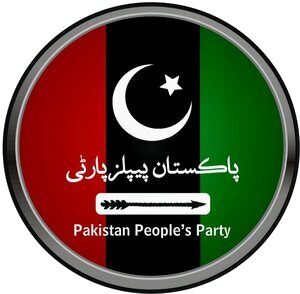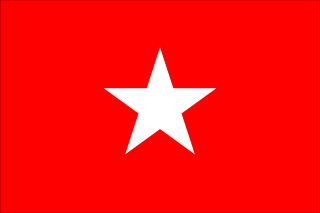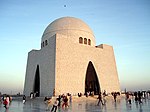
Zulfikar Ali Bhutto was a Pakistani barrister, politician, and statesman. He served as the fourth president of Pakistan from 1971 to 1973 and later as the ninth prime minister of Pakistan from 1973 to 1977. Bhutto founded the Pakistan People's Party (PPP) and served as its chairman until his execution for murder.

The Pakistan People's Party is a centre-left political party in Pakistan, currently being the largest in the Senate and second-largest party in the National Assembly. The party was founded in 1967 in Lahore, when a number of prominent left-wing politicians in the country joined hands against the rule of Ayub Khan, under the leadership of Zulfikar Ali Bhutto. It is affiliated with the Socialist International. The PPP's platform was formerly socialist, and its stated priorities continue to include transforming Pakistan into a social-democratic state, promoting egalitarian values, establishing social justice, and maintaining a strong military. It, alongside the Pakistan Muslim League-Nawaz and the Pakistan Tehreek-e-Insaf, is one of the three largest political parties of Pakistan.

Murtaza Bhutto was a Pakistani politician and leader of al-Zulfiqar, a Pakistani left-wing militant organization. The son of Zulfikar Ali Bhutto, the former Prime Minister of Pakistan, he earned a bachelor's degree from Harvard University and a master's degree from the University of Oxford. Murtaza founded al-Zulfiqar after his father was overthrown and executed in 1979 by the military regime of General Zia-ul-Haq. In 1981, he claimed responsibility for the murder of conservative politician Chaudhry Zahoor Elahi, and the hijacking of a Pakistan International Airlines airplane from Karachi, during which a hostage was killed. In exile in Afghanistan, Murtaza was sentenced to death in absentia by a military tribunal.
The National Students Federation Pakistan (NSF) is a left-wing students federation in Pakistan. In the late 1960s, NSF adopted the political line of Marxism–Leninism and Mao Zedong Thought.

Landhi is a residential neighbourhood and industrial municipality in the eastern part of Karachi, Pakistan. It is bordered by Faisal Cantonment and Shah Faisal Colony to the north across the Malir River, Bin Qasim Port to the south and east, and Korangi to the west.

Landhi Town is a Karachi borough in eastern Karachi that was named after the locality of Landhi. Landhi Town was formed in 2001, and subdivided into 9 union councils. The town system was disbanded in 2011 but restored in 2022 and Korangi Town was re-organized as part of Karachi East District, before Korangi District was formed. According to the 2023 Pakistani census, the population of Landhi Subdivision is 681,293.

New Karachi Town or North Karachi Town lies in the northern-eastern part of Nazimabad District, Sindh province of Pakistan. It was formed when katchi abadis were resettled following the 1958 coup d'état. Town system was established by City District Government Karachi in 2001. Town system was disbanded in 2011. New Karachi Town was re-organized as part of Karachi Central District in 2015. New Karachi Town has a population 1,166,742 as of 2023 Pakistani census.

The Wali Khan faction of the National Awami Party was formed after the 1967 split in the original NAP between Maulana Bhashani and Abdul Wali Khan. The Wali Khan faction was later named National Awami Party (NAP) after the independence of Bangladesh.
Events from the year 1972 in Pakistan.
Meraj Muhammad Khan, was a well-known Pakistani socialist politician. He was noted as one of the key intellectuals and founding personalities of the Pakistan People's Party (PPP) and as a major contributor to the initial left of center/social democratic so-called Basic Programme of the Pakistan Tehreek-e-Insaf (PTI). He was also the founder of Qaumi Mahaz-i-Azadi which he founded after leaving the PPP in 1977.

The Mazdoor Kisan Party is a communist party in Pakistan. It was founded on 1 May 1968 by Afzal Bangash and Sher Ali Bacha. Other prominent leaders included Ishaq Muhammad and Imtiaz Alam. In the 1970s, the MKP led a militant communist movement in Hashtnagar, Charsadda District, Khyber Pakhtunkhwa.

Rasool Bux Palijo was a Pakistani leftist, Marxist leader, scholar and writer. He was a leading human-rights lawyer and the leader and founder of Awami Tahreek, a progressive and leftist party.
The influences of socialism and socialist movements in Pakistan have taken many different forms as a counterpart to political conservatism, from the groups like The Struggle, Lal Salam which is the Pakistani section of the International Marxist Tendency, to the Stalinist group like Communist Party through to the reformist electoral project enshrined in the birth of the Pakistan People's Party (PPP).
Democracy Chowk, commonly known simply as D-Chowk, is a large town square located on the junction of Jinnah Avenue and Constitution Avenue in Islamabad, Pakistan. It is located in the government district, close to several important government buildings: the Presidency, the Prime Minister’s Office, the Parliament, and the Supreme Court.
Tufail Abbas was a Pakistani trade unionist and communist politician. He was a veteran labour leader in the airline industry, heading the Airways Employees Union. In later years he served as chairman of the Pakistan Mazdoor Mahaz and chief editor of the Urdu monthly Awami Manshoor.
The Karachi rail crash was a train accident between the Fareed Express and the Bahauddin Zakaria Express that occurred on 3 November 2016 at 7:18 PST at Landhi station, in Karachi, Pakistan. The Fareed Express was parked at the Landhi station when the Bahauddin Zakaria Express, which was traveling from Multan to Karachi, collided with the Fareed Express from behind, killing 21 people and injuring 65 people. Minister of Railways Khawaja Saad Rafique originally attributed the crash to the engineers of the Bahauddin Zakaria Express for failing to see both yellow and red signals earlier en-route, but Senator Saeed Ghani attributed the crash to a green signal being accidentally activated on the track the Bahauddin Zakaria Express was traveling on.

The 1968-69 revolution in Pakistan was part of the protest against the dictatorial regime of Ayub Khan. It took the form of a mass uprising of students and workers, attracting people from every profession. The uprising took place from early November 1968, to the end of March 1969 with 10 to 15 million people participating. The protests resulted in President Ayub Khan resigning from office.
Trade unions in Pakistan are regulated under provincial industrial relations acts. Under the Constitution of Pakistan, labour is considered a shared responsibility of the federal and provincial governments. The latest Industrial Relation Act was promulgated on 12 March 2012 by President of Pakistan. National Industrial Relations Commission (NIRC) was established under Labour Policy, 1972 as a quasi-judicial authority to promote genuine trade unionism, setting up industry-wise federations of unions and at the national levels. According to NIRC, in 2016 there were 1,390 trade unions with registered 1.4 million members. There are 16 registered federations and the ratio of total union members to total employment is 2.2%.
The 1978 massacre at Multan Colony Textile Mills was one of the most brutal acts of Muhammad Zia-ul-Haq's regime in Pakistan. Paramilitary forces opened fire on striking workers, resulting in 22–133 killed and many injured.
The All Pakistan Confederation of Labour (APCOL) was a national trade union centre in Pakistan. It was formed in 1950 through a merger of PFL and EPFL and in the following years became the dominant trade union centre through government sponsorship. In the 1960s, it dissolved into PNFTU, APFOL and APFTU.










